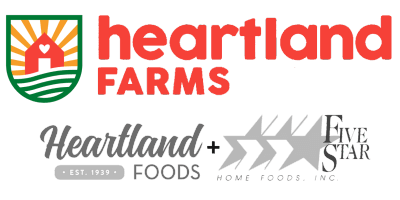7 Ways Heartland Foods Helps You Live Sustainably

hile most of us know that frozen foods are a convenient and cost-effective way to stretch your budget, many of us do not take into consideration the vital role frozen foods play in creating a more sustainable food supply and contributing to the health of our planet. Let’s take a closer look and learn more about the impact frozen foods have on our planet.
How do frozen foods help create a sustainable food supply and contribute to the health of our planet?
hile most of us know that frozen foods are a convenient and cost-effective way to stretch your budget, many of us do not take into consideration the vital role frozen foods play in creating a more sustainable food supply and contributing to the health of our planet. Let’s take a closer look and learn more about the impact frozen foods have on our planet.
How do frozen foods help create a sustainable food supply and contribute to the health of our planet?
What are the 7 way ways in which Heartland Foods helps?
- Reducing Food Waste: One of the primary benefits of frozen foods is that they can help reduce food waste. By freezing food, it can be stored for longer periods, allowing it to be preserved and consumed later. This can prevent food from going bad and being thrown away, which reduces food waste and helps conserve resources.
- Extending Shelf Life: Frozen foods have a longer shelf life than fresh foods. This means that they can be stored for longer periods without the risk of spoilage or degradation. This can help reduce the need for frequent transportation and distribution of fresh foods, which can help reduce greenhouse gas emissions associated with transportation.
- Enabling Seasonal Availability: Frozen foods allow for seasonal produce to be enjoyed year-round, which can reduce the demand for out-of-season produce that is grown in energy-intensive greenhouses or transported from distant locations.
- Lowering Energy Consumption: Frozen foods require less energy to transport and store than fresh foods. This is because fresh foods often need to be transported long distances and stored in energy-intensive refrigerated environments. By buying frozen foods, customers can reduce the energy consumption associated with food transportation and storage.
- Reducing Carbon Footprint: Frozen foods have a lower carbon footprint than fresh foods. This is because fresh foods often need to be transported by truck or plane, which emits greenhouse gasses. Frozen foods, on the other hand, can be transported by ship or train, which emits fewer greenhouse gasses.
- Reducing Water Usage: Frozen foods require less water for storage than fresh foods. This is because fresh produce often needs to be rinsed or washed before being stored, which requires water. Frozen foods, on the other hand, do not require this additional water usage.
- Supporting Sustainable Farming: Many frozen food companies source their ingredients from sustainable farms. By purchasing frozen foods from these companies, customers can support sustainable farming practices that help protect the health of the planet.

Numerous Benefits
As you can see, frozen foods offer numerous benefits when it comes to sustainability. By reducing food waste, lowering transportation and storage needs, and providing year-round access to seasonal produce, they help to create a more sustainable food system. Additionally, frozen foods provide consumers with convenient, healthy, and affordable options that are readily available at any time. With sustainability becoming an increasingly important issue in the food industry, frozen foods offer a practical and effective solution for reducing waste and promoting a healthier planet. As such, they are an important part of the food supply chain and will continue to play a significant role in building a more sustainable future.



